|
FANTASTIC FINISHES ON THIS PAGE
National
League
NL
1964 – 1
NL
1964 – 2
NL
1938 – 1
NL
1938 – 2
NL
1938 – 3
NL
1914 – 1
NL
1914 – 2
NL 1981 - 1
NL 1981 - 2
NL 1981 - 3
NL 1981 - 4
Fantastic Finishes - I
Fantastic Finishes - II
Fantastic Finishes - IV
Baseball
Magazine
Golden Rankings Home
|
Fantastic
Finishes - III
This
feature discusses the stretch run of a close pennant race.
|
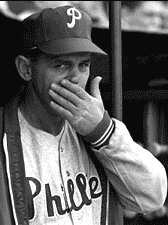
Gene Mauch
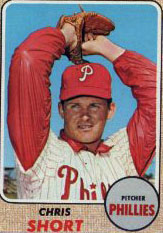
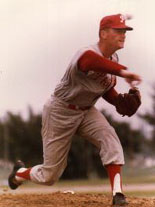
Jim Bunning
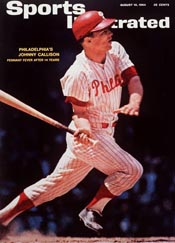
Johnny Callison
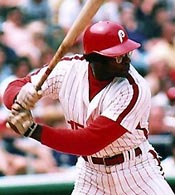
Richie Allen
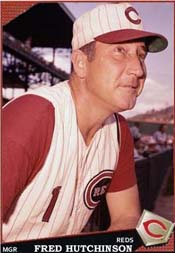
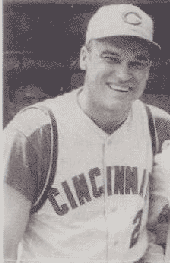
Dick Sisler |
In the wee hours of Monday, September 21, 1964, the Philadelphia Phillies returned home from a series across the continent in Los Angeles. About 2,000 faithful fans, including the mayor, met their heroes at the airport. Why? Because the Phillies led the NL by 6 1/2 games with only 12 to play.
So confident were the Phillies that they had printed World Series tickets: $25 for a box seat for four games, $17 for a reserved seat, and $9 for bleacher seats. The players were already placing their orders. SS Ruben Amaro had ordered $1,000 worth of tickets, and his mother, father, and sister were planning to travel from Mexico for the Fall Classic.
Manager Gene Mauch warned his players that they still had work to do. He reminded them of what had happened 14 years earlier.
The 1950 Phillies had a 7 1/2 game lead with only eleven games to play. But they lost eight of their next ten and had to win the last game to save the pennant.
- Monday, September 21: The second-place Cincinnati Reds came to Philly for a three-game series. Art Mahaffey, Mauch's #3 starter, matched John Tsitouris goose egg for goose egg for five innings. Then what some identified later as a turning point in the season occurred in the top of the sixth. Chico Ruiz was on third with two outs with the Reds' top hitter, Frank Robinson, at bat. Ruiz suddenly broke for home and, when the startled Mahaffey threw a wild pitch, scored the only run of the game. "It just came in my mind," the Red rookie said later. Mauch commented, "If you're thrown out on that play, you're on your way back to the minors." Still, his Phils led Cincy by 5 1/2 and the idle Cardinals by 6. Fans submitted more than 60,000 World Series ticket applications.
- Tuesday, September 22. The Reds shelled Philly's ace lefty Chris Short, 9-2. St. Louis beat the Mets 2-1 in New York amid stories that their manager, Johnny Keane, would be fired at the end of the season because the Cards had underachieved.
- Wednesday, September 23: Cincy completed the sweep, 6-4, as rookie lefty Billy McCool won his first major league start. However, the Mets turned the tables on the Cards, 2-1. The Reds trailed by only 3 1/2, and the Cardinals and San Francisco Giants by 5. As the race tightened, so did the Phils.
- Thursday, September 24: Philadelphia hosted the Milwaukee Braves, a good-hitting, poor-pitching fifth place team. Mauch sent out his right-handed ace, Jim Bunning, to end the losing streak. However, another rookie southpaw, Wade Blasingame, outpitched Jim, 5-3. Across the state, the Cardinals swept a DH from the Pirates behind Bob Gibson and Ray Sadecki. The idle Reds were now 3 down and the Cards only 3 1/2.
- Friday, September 25: It was the Reds' turn to sweep a DH, over the last-place Mets at Shea Stadium. The Cardinals beat Pittsburgh again, and the Giants upended the Cubs. Short, returning to the mound with only two days rest, pitched shutout ball for six innings but gave up 3 in the 7th and 8th. RF Johnny Callison thrilled the crowd of 30,447 at Connie Mack Stadium with a tying two-run HR in the ninth. Joe Torre hit a two-run clout in the top of the 10th, but the Phils again staved off defeat as rookie 3B Richie Allen swatted a two-run shot in the bottom of the inning. But the Phils couldn't counter the two runs the Braves pushed across in the 12th and lost their fifth straight, 7-5. The lead had shrunk to 1 1/2 over the Reds, 2 1/2 over the Cardinals, and 3 1/2 over the Giants with seven games left.
- Saturday, September 26: The Reds' Tsitouris won again over the Mets. Curt Simmons pitched the Cards past the Pirates. The Phils held a 4-3 lead with Bobby Shantz pitching in the ninth. But Hank Aaron and Eddie Mathews singled to put men on first and second. PH Frank Bolling grounded to SS Amaro, who flipped the ball to 2B Tony Taylor. But Taylor dropped the ball to load the bases. Rico Carty cleared them with a triple. 43-year-old lefty Warren Spahn retired the Phils in order for the save. In less than a week, Philadelphia's lead had shrunk by six games to only 1/2 over the Reds, 1 1/2 over St. Louis, and 3 over the Giants.
- Sunday, September 27: The Giants lost the opener 4-2 at Wrigley Field, and then the Cubs scored four in the eighth off 20-game winner Juan Marichal for the sweep. The Reds swept their DH in New York to make it nine straight. In Pittsburgh, Roger Craig and Barney Schultz combined to shut out the Bucs and complete the five-game sweep. The Phils' bats finally got hot as they pounded out 8 runs, sparked by Callison's three HRs. But Bunning, on two days rest, had nothing as the Braves swept the series, 14-8. Incredibly, the Reds were now in first place, a game ahead of Mauch's crew. St. Louis lurked 1 1/2 back while the Giants fell 4 1/2 down.
One of the greatest turnarounds in baseball history had occurred in one week because the Phillies lost seven straight on their home stand, while Cincinnati won nine in a row on the road.
- The boos from the 20,569 customers Sunday made the Phils happy to be finishing the season on the road, starting with three against the Cardinals.
- When the Reds arrived at the airport Sunday evening, acting manager Dick Sisler called former manager Fred Hutchinson, who had resigned in August because of lung cancer. Sisler, who homered to clinch the pennant for the 1950 Phillies, didn't promise the club would win the pennant but did vow they wouldn't choke.
|
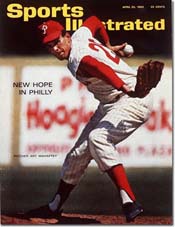
Art Mahaffey
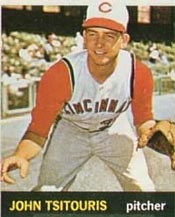
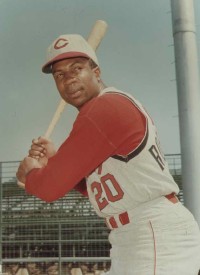
Frank Robinson
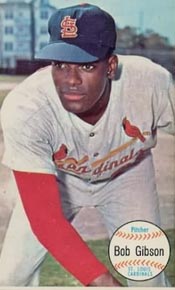
|
|
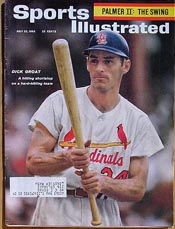 Dick Groat
Dick Groat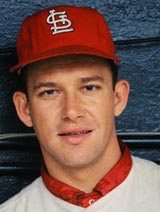
Ray Sadecki
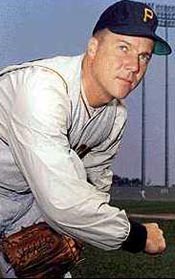
Bob Friend
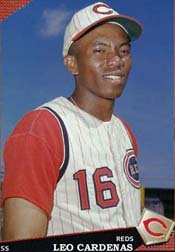
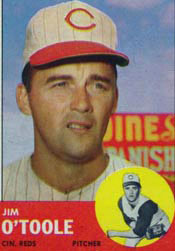
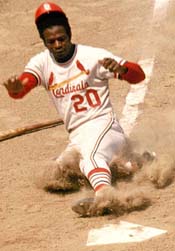 Lou Brock
Lou Brock
|
What writer Allen Lewis called "the blackest seven days in Philadelphia baseball history" had seen the Phillies lose all seven at home to fall a game behind the Reds and only a half game ahead of St. Louis, Philadelphia's opponent in a three-game series at Sportsman's Park to start the last week of the season.
- Monday, September 28: Dick Groat, St. Louis SS who had been MVP on the Pirates' 1960 World Series champs, told his teammates: "We had to win all five in Pittsburgh to stay in it, and we did. Now we've got to win all three against the Phillies." Mauch, his hopes for a rainout dashed, went with Short on two days' rest again. But he was no match for Gibson, who won his 18th, 5-1. The Cards passed the Phils to trail the idle Reds by one while Philly lagged 1 1/2 behind.
- Tuesday, September 29: The Cards won their seventh straight, 4-2, extending the Phillies' losing streak to nine. 38-year-old knuckleballer Barney Schultz, who had originally signed with the Phils in 1944, saved his fifth straight game to give Ray Sadecki his 20th win. However, the Reds, dispirited by the sparse crowd of 10,858 at Crosley Field, were cooled off by Bob Friend of the Pirates, 2-0. That threw St. Louis and Cincinnati into a flat-footed tie for first with the Phillies 1 1/2 back. The Giants were 3 1/2 behind but running out of games.
- Wednesday, September 30: Bunning, insisting he felt fine, toed the slab again on two days' rest but the Cards led 8-0 after four. Curt Simmons, one of the Phils' Whiz Kids of 1950 who had a 16-2 record against them since they released him in 1960, took a no-hitter into the seventh as the Cards won their eighth straight, 8-5. The Redbirds then retired to their clubhouse to listen to the Cincinnati game, which had gone deep into extra innings. Only 8,168 saw lefty Bob Veale extend the Reds' scoreless streak for 12 more innings before a reliever took over and continued the misery. The Pirates finally pushed a run across in the 16th on a suicide squeeze to win despite garnering only five hits. On the West Coast, the Giants played their second straight 11-inning contest, defeating Houston 5-4. St. Louis found themselves in first place a game ahead of the Reds and 2 1/2 over the Phils.
- Thursday, October 1: The Giants finished their sweep of the Colt .45s but, more importantly, the Reds ended their losing streak, defeating Pittsburgh 5-4. That cut the idle Cards' lead in half. The final weekend series pitted the Phillies at Cincinnati while the Cards hosted the last-place Mets with Gibson starting the opener. Anyone who knew baseball should not have been surprised that it didn't turn out to be easy for the Cardinals.
- Friday, October 2: During batting practice, Mauch got a surprise visit from Fred Hutchinson, who told him, "I wish there was something I could say to help." Gene was stunned that the cancer-stricken former Reds manager was thinking about him. Short, on three days' rest for a change, pitched creditably before a "lively crowd" of 25,228. But the Phils trailed 3-0 going into the eighth against the Reds' ace lefty, Jim O'Toole. An incident had occurred in the bottom of the seventh that, in retrospect, was credited with awakening the Phils. Short plunked Leo Cardenas with a pitch. The fiery Latin threatened Short with his bat before being restrained by teammates. Coincidence or not, the visitors finally strung together some hits, including a two-run triple by Allen, to plate 4, more than they had averaged during their 10-game losing streak if you throw out the 14-8 loss to the Braves. They held on to win their first game since the 20th. Afterwards, O'Toole, furious that Cardenas, still thinking about the confrontation with Short, had let a soft liner drop for a hit to start the Phillie rally, accosted Leo in the clubhouse before teammates separated them. Further west, Cardinals' owner Gussie Busch offered Keane a one-year contract for 1965. Annoyed at the firing rumors, Johnny wouldn't commit. That night, little Al Jackson outdueled the mighty Gibson 1-0 to end the Cardinals' 8-game streak and move Casey Stengel's Mets from 41 behind to 40. So St. Louis still led Cincy by 1/2 game while the Phillies stayed alive, 1 1/2 back.
- Saturday, October 3: Due to some odd scheduling, Cincinnati and Philadelphia had the day off before finishing the season Sunday. Surely the Mets wouldn't defeat the league leaders again. Well, they not only won, they clobbered the Redbirds 15-5, knocking out Sadecki early. So with one day left, the Cards and Reds were tied at 92-69 with the Phillies a game back. If the Mets won again Sunday and Philly beat Cincy, the race would end in an unprecedented three-way tie. The NL office drew up a complicated schedule to handle that eventuality.
- Sunday, October 4: The game in Cincinnati started an hour earlier in the Eastern time zone. Sisler decided to pitch Tsitouris, who told reporters Saturday he wanted $2,000 extra for such an important game, because he threw well against the Phils. Many Reds were upset it wasn't Jim Maloney, who had won 23 in '63 and had a streak of 20 scoreless innings this month. Bunning, on three days rest, finally found his groove, and Tsitouris lost his as the Phillies romped, 10-0. But it was too much to ask the Mets to win three in a row. Simmons gave up three runs in 4 2/3 innings. Perhaps thinking of Dizzy Dean in 1934, Keane brought in Gibson, who had pitched eight innings Friday night. The Cards put up 3 spots in the fifth, sixth, and eighth to win their first pennant since '46, 11-5. Gibson got credit for the win, his 19th. Lou Brock, acquired from the Cubs in a June deal when the Cards were in 7th place, had two hits and scored two to finish as the club's top hitter (.315) and thief (33 SB).
Because he had pitched so much against the Mets, Gibson couldn't start the Series Wednesday against the Yankees, who clinched the AL pennant on Saturday. Instead, Sadecki defeated Whitey Ford, 9-5. After losing Game 2, Gibson won the pivotal Game 5, then returned on two days rest to cop Game 7. These were his first two of an incredible run of seven straight post-season victories. The key blow in the Series was 3B Ken Boyer's grand slam to win Game 4.
Both pennant winners lost their managers. The Yankees fired Yogi Berra and hired Keane.
References: Walkoffs, Last Licks, and Final Outs: Baseball's Grand (and not-so-grand) Finales, Bill Chuck and Jim Kaplan
Pennant Races: Baseball at Its Best: Dave Anderson
|
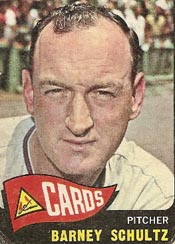
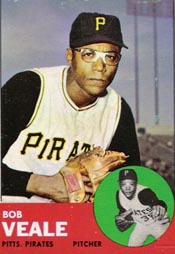
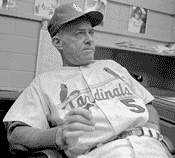
Johnny Keane
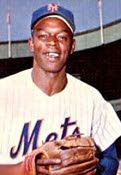
Al Jackson
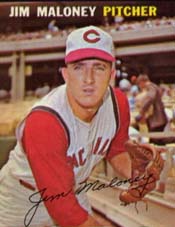
|
|
|
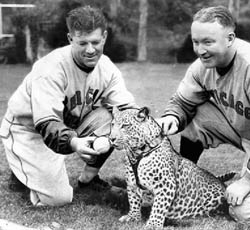
Charley Grimm and
Gabby Hartnett
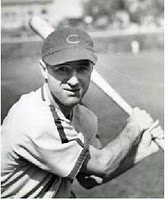
Billy Jurges
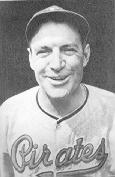
Pie Traynor
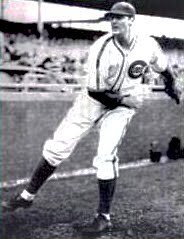
Bill Lee
|
The 1938 NL pennant race featured a come-from-behind winner, interference from a hurricane, and one of the most famous HRs in baseball history.
On July 22, the top of the NL standings looked like this.
- Pittsburgh 51-29 ---
- New York 51-33 2.0
- Chicago 46-37 6.5
Despite the fact that the Cubs were in third place and had just won 8-of-10, owner Philip Wrigley decided to change managers. He demoted Charley Grimm, who had won pennants in 1932 and 1935, to the radio booth and made C Gabby Hartnett his skipper after the first choice, SS Billy Jurges, turned it down. Phil explained:
The decision to change was not a sudden one. I have been thinking about it for quite some time. In fact, I've thought about it so much that I've lost sleep over it and also much of my appetite. Grimm did a swell job, but I think that the change is the best for the baseball organization. Charley gave everything he had, but the club was not doing as well as we felt it should.
The change didn't have an immediate positive impact on the Cubs.
- Harnett's charges won the first four under his leadership but turned around and lost the next four to fall 7.5 behind.
- The red-hot Pirates went 40-14 during June and July. Pie Traynor's club took over the lead from the Giants on July 12 near the end of a 13-game winning streak.
- Pittsburgh management felt so confident they would host the World Series that they began enlarging the press box, added mroe bleachers, and began arrangements to install telegraphic equipment for reporters to file their stories.
Hartnett struggled to gain the confidence of his team.
- He held his first closed-door meeting with the players two weeks after taking the helm. Gabby was upset with the club's "gentle swinging with the bases full." He apparently singled out 1B Rip Collins, a former Gashouse Gang member, and OF Frank Demaree.
- The Cubs responded by losing ground. Their record for the first month under Hartnett was 14-15, putting them 9 behind the high-flying Bucs.
- Chicago had developed an annoying habit of playing up or down to the opposition. They had taken the last two series from the Giants 5 games to 1 and won their next series over Pitt 2-1. But their record against the worst four teams (Boston, St. Louis, Brooklyn, Philadelphia) was only 5-9.
- At this point, the Cubs seemed more likely to finish in the second division for the first time since 1925 rather than make a run at the pennant, especially after they committed six errors in losing to Pittsburgh on August 20.
- Compounding Hartnett's problems was his own injury, a fractured right thumb August 15 that kept him out of action for several weeks.
- Reporters wondered whether Gabby would survive as manager to the end of the season.
Proving once again that baseball is the most unpredictable of sports, the Cubs began playing better.
- The turnaround began with a DH sweep of the leaders in Wrigley Field on Sunday, August 21. Ace Bill Lee, a native of Plaquemine LA, fired a 3-hit shutout in the opener to win his 17th against 9 losses.
- Even though Pittsburgh salvaged the final game of the series for a split, the Cubs gained some momentum by winning seven of the remaining ten on the homestand against the Eastern clubs. They had nosed into second place, 7 behind, as they embarked on a road trip to other three western cities.
- After losing the first two at Cincinnati, the Cubs won the remaining six, including a doubleheader sweep in Pittsburgh on Labor Day.
After returning home briefly to split a two-game series with the Reds, Chicago departed September 12 for a tour of the four Eastern cities 3.5 games out, the closest to first they had been since June 28.
To be continued ...
Reference: Baseball's 25 Greatest Pennant Races, Lowell Reidenbaugh
|
|
When the Cubs and Pirates left for a swing through the Eastern cities on September 12, the standings looked like this.
- Pittsburgh 77-54 ---
- Chicago 75-59 3.5
- Cincinnati 74-61 5.0
- After losing the opener in Boston 5-3, the Cubs beat the Bees (as the Braves were called then) 6-3 on September 14 on a disputed grand slam by player-manager Gabby Hartnett. His thumb healed, the C pulled a pitch down the LF line at the Bee Hive. The umpire called it fair to set off a heated argument by Bees manager Casey Stengel. Chicago sportswriter John Carmichael wrote: "It was clearly a foul ball, but the umpire called it a home run." Meanwhile, the Pirates dropped a pair to the Giants at the Polo Grounds to reduce their lead to 2.5.
- On September 15, four pennant contenders inhabited the Polo Grounds. The Cubs and Reds took a "busman's holiday" on their day off to watch the Pirates clout five homers to drop the Giants into 4th place, 7-2.
- After another day off, the Cubs swept a Saturday DH from the Giants. Lee twirled a 4-0 shutout in Game One, and Clay Bryant won the nightcap 4-2.
- Chicago moved across town to Brooklyn for a Sunday DH. The Dodgers copped the first game 4-1 to drop the Cubs 3.5 behind Pittsburgh. Hartnett's crew salvaged a tie in the second when 2B Billy Herman made a leaping grab of Gilly Campbell's bases-loaded liner in the bottom of the fifth just before darkness descended. Even though the Dodgers had installed lights earlier that year (with Johnny VanderMeer throwing his second straight no-hitter in the first night game at Ebbets Field), league rules prohibited turning on the lights to finish a game that started in the daytime. Also, a tie had to be replayed from the beginning. So a second game was added to Monday's scheduled single game.
At that point, Mother Nature made a significant impact on the NL season.
- "The Great Hurricane of 1938" – hurricanes were not named until after World War II – came up the East Coast packing winds up to 160 mph. It blanketed the Eastern states with rain and wiped out baseball for three days.
- Dodger GM Larry MacPhail asked the Cubs to return to Brooklyn on their off day, Friday, to play the rained-out DH. Much to the displeasure of the Pirates, NL Commissioner Ford Frick left the decision up to the visiting team, and Hartnett declined. He was thinking ahead to the homestand the Cubs would start the next Saturday with three against the Cards and then an all-important series with the Pirates.
- The Cubs finally played a DH with the lowly Phillies, who were buried in the cellar 30+ games out of seventh place. Lee scattered 10 hits in the opener for his 20th victory, 4-0, and Bryant won the second, 2-1.
- On Friday, which had originally been an off day, Chicago swept the Phils again, 3-2 and 7-6. OF Augie Galan's eighth-inning HR won the opener, and Ripper Collins' bases-loaded double in the ninth pulled out the nightcap. Hartnett's decision not to return to Brooklyn gave the Cubs two more games against the pathetic Phillies rather than two against the Dodgers.
- Elsewhere, the rain had washed out the Pirates DH with the Phillies that had been scheduled for Monday. Pittsburgh then entrained to Brooklyn and swept the Dodgers on Thursday. Then they went home to Pittsburgh, where they lost to the Reds on Friday. That moved the Cubs to within two of first.
The Cubs returned to the Friendly Confines of Wrigley Field on Saturday, September 24 for three games in three days against the 6th-place Cardinals.
- Saturday: The Cubs downed the Cardinals 9-3 while the Pirates upended the Reds 4-1. The difference stayed at 2 games.
- Sunday: Pitching on two days rest, Bryant beat the Redbirds 7-2. The Pirates took Cincy again, 5-3.
- Monday. The Cubs completed the sweep, 6-3, behind Lee whose 37 1/2 inning scoreless streak ended. The Pirates spent the day traveling to Chicago for the big series starting Tuesday. Their lead was 1.5 games.
With only a week left, the pennant came down to the three-game series at Wrigley Field.
To be continued ...
References: Baseball's 25 Greatest Pennant Races, Lowell Reidenbaugh and
Pennant Races: Baseball At Its Best, Dave Anderson |
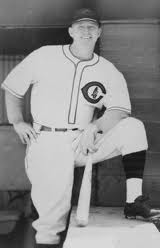
Gabby Hartnett
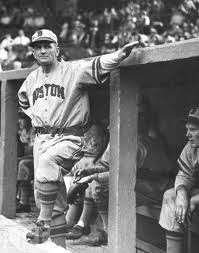
Casey Stengel
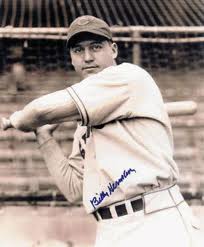
Billy Herman
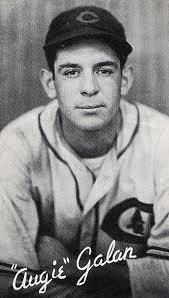
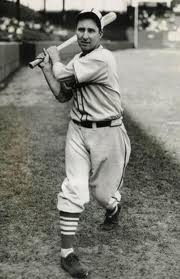
Ripper Collins
|
|
NL 1938 – III
This
feature discusses the last weeks of a close pennant race in the NL or AL.
|
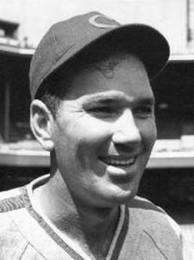
Dizzy Dean
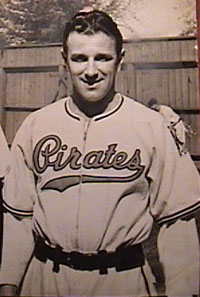
Lee Handley
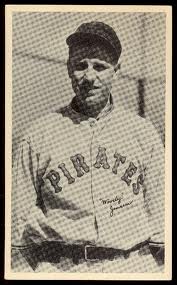
Woody Jensen
|
Gabby Hartnett surprised the baseball world by choosing Dizzy Dean to open the crucial three-game series with Pittsburgh at Wrigley Field.
- The Cubs had obtained the sore-armed righthander from the Cardinals three days before the season began for $185,000 and three players.
- Ol' Diz had won six games and lost only one with a 1.80 ERA in spot duty. The fact that he hadn't started since August 20 actually worked in his favor since his was the only rested arm on the staff.
- Gabby was counting on the 30-game winner of the 1934 World Champion Gashouse Gang to rise to the occasion.
- Before the game, Cubs trainer Andy Lotshaw rubbed Diz's right shoulder and arm with hot ointment. Phil Cavaretta recalled: "His shoulder and arm was as red as a lobster."
The Associated Press article the day of the game analyzed Hartnett's decision this way.
The Chicago Cubs paid plenty for Dizzy Dean and expect plenty of victories in return, but Manager Gabby Hartnett was willing to settle for one today—the series opener against Pittsburgh's National league leaders. Dean and his famous sore arm proved a gamble for the Cubs from the start. Today he was Hartnett's finesse to a championshlp. If he wins, the Cubs would be a half game behind the pace setters and Hartnett would have his highest trumps Clay Bryant and Bill Lee to play against the Pirates tomorrow and Wednesday. If he loses, the Cubs still would retain an outside chance. It was merely another gamble for Hartnett, who has called enough turns to bring the Cubs 17 of their last 20 games –-seven of them in a row.
Pirates manager Pie Traynor countered:
We don't care a whoop who Chicago pitches against us. We are steaming at our proper pace now and if we win five of our remaining seven games, it doesn't make any difference how many the Cubs win. I'm going to play my three aces – Jim Tobin, Bob Klinger, and Russ Bauers – one right after the other. We won eight of our last ten games and these three have accounted for six of those eight."
Game One: Tuesday, September 27 – Attendance: 42,238; Time of Game: 1:38
Chicago nicked Tobin for single runs in the third and sixth. Meanwhile, Dizzy, throwing his "nothingball" and relying on guile, blanked the Bucs on six hits through eight innings. However, the visitors mounted a threat with two out and one on in the ninth.
- Lee Handley smacked a double to push Woody Jensen to third.
- With the tying runs on base and C Al Todd at the plate with two hits for the day, Gabby called in Lee for the save despite the fact that Big Bill had pitched a complete game the day before.
- Lee's first pitch got away from Hartnett, allowing Jensen to score and moving the tying run to third.
- Bill settled down and struck out Todd to move the Cubs only a half-game behind Pittsburgh.
- Afterwards, Dean had a simple explanation for his success. "It was the Lord. He had his arms around me all the time, yes sir. Lik'd to choke me, he held me so tight. Whenever I was gonna go wild, he just patted me on the head and the next guy popped up. It was a grand feeling."
|
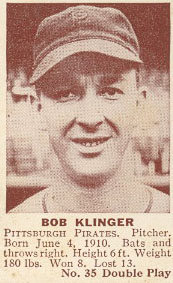
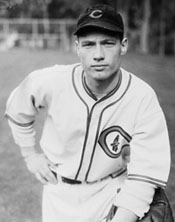
Clay Bryant
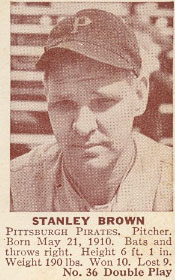
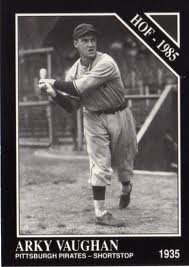
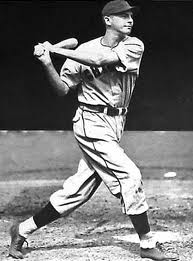
Stan Hack
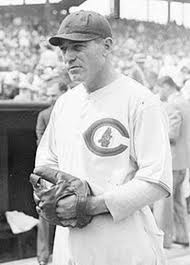
Charlie Root
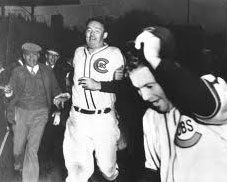
Gabby Hartnett approaching home plate after his "Homer in the Gloamin'"
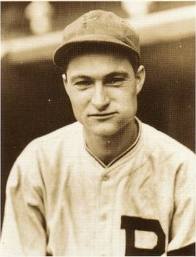
Paul Waner
|
Game Two: Wednesday, September 28 – Attendance: 34,465; Time of Game: 2:37
The heavily overcast skies held the crowd down somewhat. Those who filed into The Friendly Confines saw one of the most famous games in baseball history.
- The Cubs plated a run in the second against Klinger, a 30-year-old rookie, on a throwing error and a dropped third strike. Bryant, starting this third game in seven days, shut out the Pirates until the seventh.
- Rookie LF Johnny Rizzo clouted his 21st HR to tie the score with two out. A single by SS Arky Vaughan and walks to 1B Gus Suhr and 2B Pep Young loaded the bases. Handley's two-run single put the Buccos in front and sent Bryant to the showers.
- The Cubs tied the game in their half of the sixth. Doubles by Hartnett and Collins plated one run. Then a bunt single by Jurges and an infield out sent Ripper home with the tying tally.
- The Pirates threatened again in the seventh against 33-year-old rookie RHP Vance Page, only to be thwarted by a no-call that infuriated them. Rizzo came to bat with one out and runners on first and third. The Sporting News's reported what happened like this.
Page was facing the batter when he made a noticeable move toward the plate and then held up. Coach Jewel Ens sprang forward to call the umpires' attention to the illegal movement, and the Pirate bench warmers, who were close to first base where [Umpire Dolly] Stark was operating, insist that the arbiter rushed forward. Rizzo ... apparently was so intent on smacking what he thought would be a fat pitch he swung at the ball, hitting to [3B Stan] Hack, who went through the motions of starting a double play.
- Instead of plating the go-ahead run on the balk, the Pirates were out of the inning with no runs.
- The Pirates took the lead in the eighth when Vaughn opened with a walk, and Suhr followed with a bingle. When left-hand-hitting Heinie Manush was announced as a pinch-hitter, Hartnett summoned southpaw Larry French to replace Page. However, Manush crossed up the Cubs by singling home Vaughan.
- Hartnett then brought in the weary Lee for his third appearance in as many days. He gave up a single to Handley for a 5-3 lead.
Traynor then made several decisions that would be criticized in Pittsburgh for years to come.
- He allowed Klinger to hit for himself. Bob promptly rolled into an inning-ending DP.
- Compounding his questionable thinking, Pie yanked Klinger when Collins singled to open the home half of the eighth. A half-century later, Jensen was still bitter.
Two on, only one out, a chance to put th game away, but no pinch hitter. That was the play that no one could understand. Klinger had a tired arm. He had struggled through seven innings. Traynor had no conception of anything. If we could've locked him up in the clubhouse, we would've won.
If you let Klinger hit, let him pitch. ... We had Ed Brandt and Red Lucas in the bullpen but Traynor put in, of all people, Bill Swift, who had never beaten the Cubs.
- The heat on Traynor turned up a notch when Swift proved to be ineffective. He began by walking Jurges, then surrendering a double to PH Tony Lazzeri that scored Collins and advanced Jurges to 3B. An intentional walk to Hack loaded the bases.
- Billy Herman singled home Jurges with the tying run. However, Joe Marty, running for Lazzeri, was cut down at the plate by RF Paul Waner.
- Pie went to the bullpen again, bringing in the league's top reliever, Mace Brown – a move that had Pittsburgh fans asking why it wasn't done to start the inning.
- Brown immediately enticed Demaree to ground into a DP to keep the game tied at 5 entering the ninth.
With darkness descending, Charlie Root – the P who surrendered Babe Ruth's famous "called" HR in the 1932 World Series – toed the slab for Chicago.
- The 39-year-old veteran yielded a hit but escaped with no runs.
- As the teams changed sides for the last of the ninth, the umpires told the managers that the game would go no further than the bottom of the ninth. If the Cubs failed to score, the contest would be replayed as part of a DH the next day. Such an event would aid the Pirates with their fresher staff.
- Brown easily set down the first two batters, Phil Cavaretta and Carl Reynolds.
That put the Cubs hopes squarely in the hands of their player-manager.
- Mace's first pitch to Hartnett was a sharp curve for a called strike.
- Brown delivered another bender, which Hartnett swung and missed.
- Ahead 0-2, the reliever could waste a pitch or two. Instead, Brown fired another curve that broke over the heart of the plate. "I wanted to throw it in the direct and he probably would've chased it, but I threw it high," Brown said afterwards.
- The third time was the charm for Hartnett, who swung hard and walloped the ball solidly into the twilight in left-center field. "I knew it the minute I hit. I swung with everything I had and then I got that kind of feeling you get when the blood rushes out of your head and you get dizzy."
- Brown also knew immediately that the game was over. He brushed his hand over his eyes and strolled to the dugout. "As soon as he hit it, I knew it was gone."
- However, the spectators weren't so sure, especially in the dusk. After a few seconds of silence as they tried to follow the spheroid, they let out a roar when the ball landed in one of the first rows of the left-field bleachers.
- A Chicago Tribune reporter described the scene:
The mob started to gather around Gabby before he reached first base. By the time he reached second base, he couldn't have been recognized in the mass of Cub players, frenzied fans and excited ushers except for the red face that shone out even in the gray shadows.
After the skipper had finally struggled to the plate, things became worse. The ushers, who had fanned out to form the protective barrier around the field, forgot their constantly rehearsed maneuver and rushed to save Hartnett's life. They tugged and they shoved and finally they started swinging their fists before the players could carry their boss to safety.
There was further hysteria when Gabby reached the catwalk leading to the clubhouse. But by this time, the gendarmes were organized. Gabby got to the bathhouse without being stripped by souvenir maniacs.
- RF Paul Waner stood staring at the celebration. "I should've run to the clubhouse, but I didn't. I just stood out there and watched Hartnett circle the bases and take the lousy pennant with him."
- When Paul finally reached the clubhouse, he found Brown sitting in front of his locker, crying like a baby. Waner recalled: "I stayed with him all that night. I was afraid he was going to commit suicide. That home run took all the fight out of us."
- A fan arrived at the Cubs clubhouse claiming to have to HR ball. Hartnett autographed it and gave it back to him.
- The "Homer in the Gloamin'" put Chicago in the lead for the first time since June 7.
Game Three: Thursday, September 29 – Attendance: 42,628; Time of Game: 2:15
The Pirates could not rebound from the crushing defeat as the Cubs romped, 10-1, behind Lee to forge 1.5 games in front with four to play. Chicago had won ten in a row and 20 of their last 22.
The Cubs left for their season-ending three-game series with the Cardinals while the Pirates moved to Cincinnati for four.
- Friday, September 30: The Pirates split a DH with the Reds. The Cubs and Cards battled to a 7-7 tie called by darkness. So Chicago faced still another DH the next day with their lead still 1.5.
- Saturday, October 1: Cincinnati beat the Bucs 9-6, but Chicago lost the opener 4-3. But when the Cubs took the nightcap 10-3, they led by 2 with one to play, clinching their third pennant of the 1930s.
- Sunday, October 2: Both teams lost their anti-climactic games.
Chicago finished 89-63 with two games unplayed. Pittsburgh was 86-64 with four games never made up. The extra DH the Cubs swept against the Phillies on September 23 proved to be crucial, adding one full game to their eventual lead.
Pirate president Bill Benswanger was bitter and not in a mood to congratulate the winners.
The pennant was lost before the Cub series. The hurricane ... prevented us from winning. We went east on the final trip, good and hot. Everybody knows that when a club is hot, it can make wrong plays and win; when it is cold, nothing turns out right. Well, we were winning game after game, close ones and easy ones. ... That's the way things were going when the hurricane struck. ... To my way of thinking, pennants are won only by winning ball games, and ball games can be won only if you play them. To lose by losing ball games is one thing, to lose by idleness is another. If we played all those games in the East we would have gone to Chicago with such a lead that we could have lost all three games and still have won the flag. But as we sat around hotel lobbies ... a hot team cooled off and never regained its winning momentum. The Hartnett HR was an anticlimax, not the cause of our defeat.
Two days after their heroes clinched, 300,000 Cubs fans cheered the team's motorcade to City Hall, where Hartnett told them, "That homer was the greatest thrill of my life." In Pittsburgh, the 1938 World Series press pins that the Pirates had produced became a collector's item.
Gabby's homer continued to plague the Pirates in '39 also. Elbie Fletcher, who joined the team that year, said: "It was sad, because all they talked about was Hartnett's HR. That HR was still on everybody's mind, haunting them like a ghost. Management knew it. That's why they were trying to shake up the club. But it didn't help. The players talked about Hartnett's HR all year and finished sixth."
50 years later, Mace Brown admitted: "I still think about that homer. Not that it bothers me, but it crosses my mind." |
References: Baseball's 25 Greatest Pennant Races, Lowell Reidenbaugh
Pennant Races: Baseball at Its Best: Dave Anderson
|
|
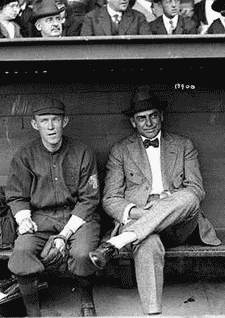
Johnny Evers and George Stallings
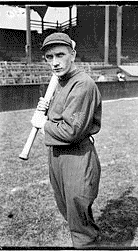
Rabbit Maranville
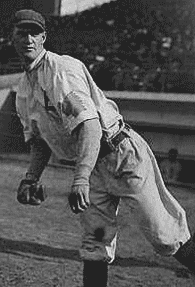
George "Lefty" Tyler
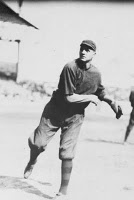
Bill James
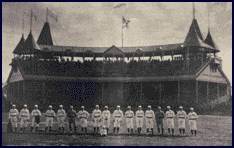
South End Grounds, Boston
|
"This club is a baseball horror."
That was the reaction of George Stallings after he was named manager of the Boston Braves late in the 1912 season. The words were spoken in response to owner James Gaffney's request for his honest opinion as the two watched the team play. "I've been stuck with some terrible teams in my time," added Stallings. "But this one beats 'em all."
The 1912 Braves finished in last place, 52 games behind the New York Giants. Under Stallings' guidance, the team moved up to fifth in 1913. When asked his managerial philosophy, Stallings answered, "Know the percentages."
In the dugout, he was a dynamo, sliding endlessly up and down the bench, shouting profanities at the players, friend and foe, as well as the umpires, whom he regarded as mortal enemies. Stallings' favorite appellation for thoughtless players was "bonehead," a word he shrieked with fervor. Once he nodded twoard C Hank Gowdy and shouted, "Go up there and hit, bonehead." In addition to Gowdy, five others reached for bats.
Stallings weeded out the players who couldn't take the pressure he put on them. "I've got no use for a player who isn't game. A game player fights back when bawled out, and that's what I like." The men who survived agreed that his system brought out the best in them.
Braves fans expected their club to continue to improve for the 1914 season.
- Stallings acquired veteran 2B Johnny Evers, just released as manager of the Chicago Cubs. Known for his combativeness, Evers brought the type of spirit Gentleman George wanted on his ballclub. The 130-lb Evers became the equivalent of a player-coach since he let players have it who blundered on the field before Stallings got a crack at them on the bench. "He'd make you want to punch him," said SS Rabbit Maranville, "but you knew Johnny was thinking only of the team."
- Presaging future platooning managers, Stallings employed two sets of outfielders who alternated against lefthanded and righthanded pitching. In this manner, he got maximum production from the weakest segment of the team.
The Braves got off to a miserable start.
- On May 20, they were 4-18 before they won back-to-back games for the first time.
- Despite winning five in a row from June 9-13, the Braves stayed in eighth (last) place through July 18. On July 4th, even then the key date for assessing a team's chances, Boston was 15 games behind John McGraw's Giants.
- Despite the frustration of losing, the club was playing hard, as illustrated by the Independence Day DH with Brooklyn.
- In the Robins' 7-5 victory in 11 innings in the opener, OF Joe Connolly was ejected for arguing a call. Then the umps had to stop a potential brawl when Lefty Tyler hit Brooklyn SS Ollie O'Mara on the back of the neck with a pitch.
- In the nightcap, Robin 1B Jake Daubert scored the winning run in the ninth inning but was knocked unconscious when he collided with C Hank Gowdy.
- With attendance hurt by the poor performance, Gaffney announced that the club was $40,000 in the red, a figure that might increase to $100,000 by the end of the season.
Stalling's boys finally started to make a strong move toward the top of the standings in mid-July.
- A six-game winning streak boosted them all the way to fourth place on July 22. The game on July 19 at Cincinnati was later regarded as a turning point as the Braves scored 3 in the ninth pull out the victory.
- As is always the case when a team goes on a lengthy winning streak, the pitching was superb. The first of three straight shutouts, 1-0 by Tyler at St. Louis, put the team over .500 for the first time all year. The next day, Bill James beat Pittsburgh by the same score. Then Dick Rudolph twirled a three-hitter, 6-0. After the Pirates won the second game of the DH July 22, Tyler blanked the Bucs 2-0.
- Boston went 12-4 on their road trip to the four western cities in the league. They now faced those same clubs at their own picturesque South End Grounds.
- After losing the opener 5-4 to the Cubs, they went on a nine-game tear, during which they recorded four shutouts. They finished the homestand in third place only six games behind the Giants.
- They then embarked on a six-city road trip that might make or break their pennant chances. The first series would be at the Polo Grounds.
Reference: Baseball's 25 Greatest Pennant Races, Lowell Reidenbaugh
|
|
The Braves began a 22-game road trip with three against the league-leading Giants at the Polo Grounds. Boston needed to win at least two in order to gain ground.
- Rudolph beat Rube Marquard in the opener, 5-3. Boston rapped out 11 hits, including a triple by Maranville and a HR and two-run single by OF Les Mann. Boston banged out 11 hits again the next day as James beat Jeff Tesreau, 7-3. Tyler went after the sweep against Giant ace Christy Mathewson. Both were in top form and the game went into the 10th scoreless. The Braves plated two on Gowdy's run-scoring triple and a wild pitch. McGraw's boys didn't go down easily, loading the bases with none out. But Tyler got the next three to preserve the shutout. Boston left for Cincinnati in second place only three and a half games behind.
- The headline in the August 20 Sporting News proclaimed: "Stallings Breaks Silence and Admits He Has Chance/Tells Braves It's Up to Them/He Thinks Giants Out of Race."
- Boston won three of four from the Reds to pull within two. The Big Three, Rudolph, James, and Tyler, produced fine performances in almost every outing. Each won a game against Cincy.
- Winning two of three in Pittsburgh moved the Braves to within a half-game of the Giants, who had lost seven of eight. When the Giants lost in Cincinnati while Boston was idle, the two teams were tied. However, New York gained back the half game when they split a DH in St. Louis while Boston lost two of three to the Cubs.
- A loss to the Cardinals dropped the Braves to third place .001 behind St. Louis and 1.5 behind New York. However, the Braves took the remaining three games of the series. James pitched a 4-hit shutout to take the first game of a DH, then Boston rallied for four in the 8th to win 6-4 in a game called after eight because of darkness. The next day, Tyler allowed only a 7th-inning single to take the finale 2-0.
- The Braves' trip ended with five in Philadelphia. Boston swept a DH on September 2 to go up by 1 as the Giants lost at Brooklyn. St. Louis was in process of being swept by the Pirates at home to fall to 6 behind by Friday the 6th. Since the Cardinals now embarked on a six-city road swing, they were effectively out of the race.
- Boston won two of the final three in the City of Brotherly Love while New York won four of six at Ebbets Field.
The Braves returned to Boston tied with the Giants atop the NL standings.
- The Braves hosted the Giants on Labor Day. Because the South End Grounds seated only 11,000, the club obtained permission of the crosstown Red Sox to play the doubleheader at 35,000-seat Fenway Park, then in its third year of use and often called "American League Park" at that time. The DH drew 74,163 fans. Boston won the morning game, 5-4, rallying for two in the ninth against Mathewson. Evers, long a Matty nemesis, singled in the tying and winning runs. However, the Giants walloped Tyler 10-1 in the afternoon to pull back into a tie. The next day, an overflow crowd of 17,000 saw the Braves take the rubber game 8-3 on their home field to retake first place.
- The Giants finally went home, where they split four with Brooklyn. Meanwhile, the Braves took four of five from the Phillies to build their lead to 2.5. Boston got a boost from an unexpected source on September 10. After they lost the opener of a DH 10-3, Harvard Law student George Davis tossed a no-hitter. It was one of the three victories he recorded that season and one ofhis seven career wins.
The Braves never looked back, winning every remaining series.
- Two of three from Brooklyn, two wins and a tie against St. Louis, a three-game sweep of Pittsburgh, and four of five over Cincinnati, and four in a row over Chicago completed the sensational 21-4 homestand.
- Unable to keep up, the Giants fell nine behind. They hosted the Braves in a five-game series September 30-October 3. Since they had already clinched a tie for the pennant, Boston needed to win only one more game. They ended the suspense by winning the opener 7-1.
The Braves, who had been 15 behind on July 4, won the pennant by 10.5 games. After a 26-40 start, they went an amazing 68-19 the rest of the way. Rudolph went 26-10, James 26-7, and Tyler 16-13. Evers edged Maranville for the league MVP award, which was a Chalmers car.
To cap their remarkable season, the Miracle Braves swept the Philadelphia A's in the World Series.
|
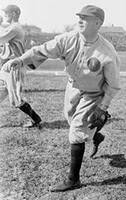
Dick Rudolph
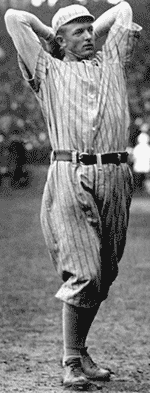
Christy Mathewson
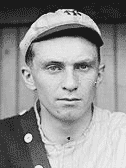
George Davis
|
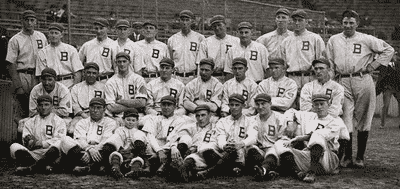 The 1914 Miracle Braves The 1914 Miracle Braves
Reference: Baseball's 25 Greatest Pennant Races, Lowell Reidenbaugh
Top of Page
|
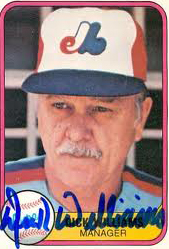
Dick Williams
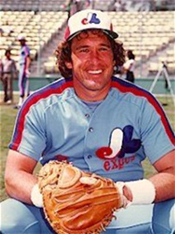
Gary Carter
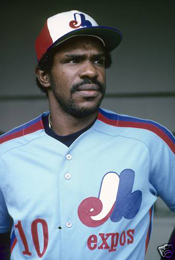
Andre Dawson
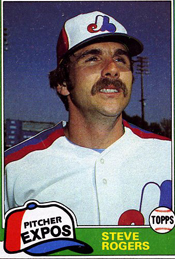
Steve Rogers
|
1981 ranks as one of the weirdest seasons in MLB history. A two-month players' strike occurred in midseason and caused MLB to split the season in half and have playoff representatives from each half. In this series of articles, we'll recount the NL pennant race that year from the point of view of one team.
Les habitants of Montreal looked forward with great anticipation to the '81 season.
- Since their inception in 1969 as an expansion team, the Expos had been bottom feeders, finishing no higher than 4th in the six-team NL East through 1978.
- However, the '79 club, under the direction of third-year manager Dick Williams, who had won a pennant with the Red Sox ('67) and two World Series with the Oakland A's (1972-3), won 95 games to finish second only two games behind the Pirates.
- 1980 brought another "close but no cigar" season. The Phillies edged Montreal by one game. Like the '79 Pirates, Philadelphia won the World Series. So for two years in a row, the Expos could argue that they were the second best team in baseball.
- Many writers pegged Montreal as the favorites to take the East.
The '81 Expos sported an impressive lineup, including:
- C Gary Carter, the team's RBI and HR leader in '80 with 101 and 29, respectively
- 1B Warren Cromartie
- SS Chris Speier
- 3B Larry Parrish
- LF Tim Raines, the 1980 Minor League Player of the Year who would add speed on the basepaths
- CF Andre Dawson, whom many rated the best at his position in baseball, a .308 hitter the season before who led the team in slugging with .492 aided by a team-leading 41 doubles
- RF Ellis Valentine, who led the team in '80 with a .315 average
The pitching staff was solid, led by three right-handers.
- Steve Rogers was the ace, with 16 victories in '80 and a 2.98 ERA
- Scott Sanderson, another 16-game winner with 3.11 ERA
- Bill Gullickson, 10-5 and 3.00 ERA the year before
- Woody Fryman, 41-year-old lefty, led the club in saves with 17
The Expos jumped out 12-4 to hold down first place by the end of April.
- By mid-May, the Phillies and Cardinals had both passed Montreal.
- On May 29, Montreal GM John McHale engineered a trade with the Mets. He swapped troubled RF Ellis Valentine for relief P Jeff Reardon.
- A five-game losing streak to start June briefly dropped the Expos to fourth.
- Montreal swept the Braves, outscoring them 30-3.
When that series ended, the MLPA went on strike.
- The main issue was free agent compensation - what teams would receive should one of their star players sign with another team.
- The strike dragged on until early August, when a compromise was reached.
- Play resumed on August 10.
Since there was no way to make up so many missed games, the owners decided to split the season, as was done in some of the minor leagues.
- The four teams that were leading their divisions when the strike began would make the playoffs. In the NL, those winners were the Phillies and Dodgers.
- The four teams that won the second half of the season would also make the post-season, thus adding two preliminary series to each league before the winners competed in the League Championship Series.
|
When the 1981 season resumed on August 10 after the players' strike, all teams began at 0-0 again.
- Expos manager Dick Williams made one change in his lineup. He installed rookie Tim Wallach at 1B in place of veteran Willie Montanez, who was hitting below .200.
- Willliams also pressed CEO John McHale for some veteran bats. So McHale traded Montanez on August 20 to the Pirates for John Milner, whom Williams immediately placed in the middle of the lineup. John still had some power but could no longer hit for average, run, or field very well.
- On September 1, the NL East standings for the second half of the split season showed the Cardinals on top with a 12-6 record and Montreal second at 11-8. Philadelphia, the first half division winner with a playoff berth already secured, languished at 7-13.
On August 30, Williams had made a managerial decision that would contribute to his firing.
- Dick sent his ace P, Steve Rogers, to pinch-run in the 11th inning against the Braves.
- In attempting to break up a double play, Rogers broke a rib, knocking him out for two weeks. As Steve Wulf wrote in Sports Illustrated:
Even Rogers, a sometime critic of Williams, defended the move, but as far the Expo fans were concerned, that broke the camel's back, not to mention Rogers' rib. The callers on sports phone-in shows in Montreal were outraged, and when the Expos returned hom on Sept. 3 the fans were singing, "Dick Must Go." The front office was listening.
- Another bone of contention as far as McHale was concerned was Willliams' failure to use Jeff Reardon more. McHale had acquired the RHP before the strike for Ellis Valentine in the expectation that Jeff would be the closer. However, Williams had summoned him only 12 times in six weeks even though Reardon had pitched effectively - just 4 earned runs in his last 43 innings.
- Worst of all, Williams had become a recluse who had alienated the players. Rogers: "His style ranged from extreme noninterference to biting, caustic remarks. The result was lackadaisical play." Eccentric LHP Bill Lee: "He would sit in his corner of the dugout, writing things in his little charts, playing ticktacktoe with himself."
- One of the highest-paid managers in baseball, Williams didn't expect McHale to retain him when his contract expired at the end of the season.
Still, everyone was surprised when John fired Williams on September 8.
- The CEO insisted the canning had nothing to do with the persistent rumors that Dick was headed to the Yankees, whose owner George Steinbrenner had just fired Gene Michael two days earlier.
- McHale cited his dissatisfaction with the Expos' performance. "I saw this year too many instances when there was not a soundness in our play. We were ragged, not crisp, often late with a relief pitcher, a pinch-hitter or a pinch-runner."
- Also, "I don't think Dick wanted to get involved in closeness with his players. He was a very detached sort of guy. ... He was sarcastic, biting. Sometimes he was clever, humorous. But these things found their way to the public, and the players don't like it."
McHale turned to an old friend as his new skipper.
- Jim Fanning had an undistinguished career as a C for the Cubs (1954-7) before becoming a minor league manager.
- Jim had been McHale's GM the first eight years of the Montreal franchise.
- When the call came to get back in uniform, Fanning served as vice-president of player development for the Expos.
- The choice came as a complete surprise to everyone, including Fanning himself. Wulf:
He literally didn't know how to tie his shoes. Jim Fanning had the intricacies of the bowknot down pat, but on his first day as manager of the Montreal Expos he had to ask his coaches whether the bow went over or under the flap that extends from the tongue of baseball shoes. Fanning, the former backup catcher to Joe Garagiola, hadn't been in uniform since he managed the Eau Claire (Wis.) Braves ... in 1962.
Fanning got off to a shaky start.
- The Expos lost at Philadelphia 10-5 to fall to 13-12, 2 1/2 behind St. Louis.
- The next night, Montreal squandered two leads and lost 11-8 to the Phillies, leading a Philly writer to refer to Fanning as "Alice in Blunderland."
- In Chicago the next day, the Expos failed to score the tying run with runners on first and third and none out in the ninth. They now stood at 14-15, 2 1/2 behind the Cardinals.
Even players who had griped about Williams questioned Fanning's hiring.
- Warren Cromartie, whom Fanning benched, was not happy. "For the first time in five years, I sit down. ... We needed a change, but not this change. We're a game and a half out [when the change was made], everybody's future's on the line, and we've got a guy coming down from the booth."
- Lee: "We've changed horses in mid-torrent. And we haven't even got on the horse, and now we're tumbling over and over down the river of despair."
- Even White Sox announcer Harry Caray piled on. "The Expos haven't won since replacing Dick Williams as manager. Nice going, John McHale. With an intellect like that, you could graduate from Notre Dame." Apparently Harry didn't know that McHale did graduate from Notre Dame.
With conditions ripe for a collapse, the Expos got hot.
Reference: "Will Inexperience Be a Great Teacher?", Steve Wulf, Sports Illustrated, September 21, 1981
Top of Page |
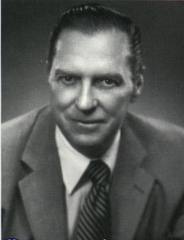
John McHale
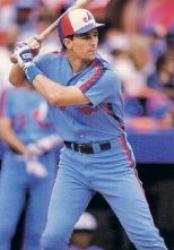
Tim Wallach
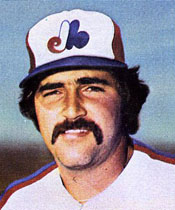
Jeff Reardon
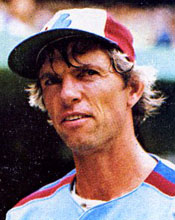
Bill Lee
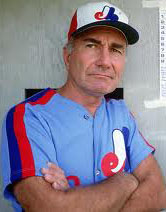
Jim Fanning
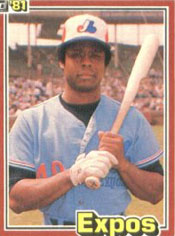
Warren Cromartie
|
|
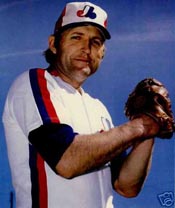 Woody Fryman
Woody Fryman
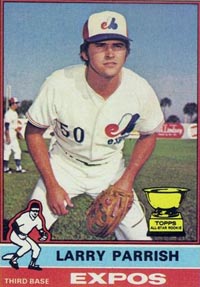
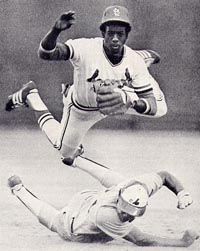
Garry Templeton
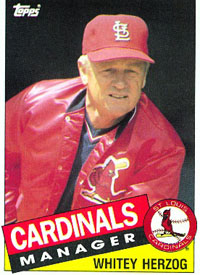
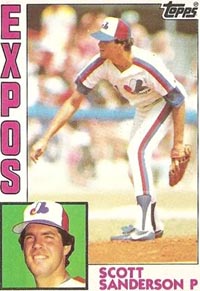
|
Struggling to adjust to their new manager, the Expos lost their first three games under Jim Fanning.
- However, Montreal won the last two games at Wrigley Field to nose back above .500 at 16-15.
- Steve Rogers pitched valiantly in the first victory before aggravating his rib injury batting in the 7th. Woody Fryman and Jeff Reardon preserved the 2-0 victory.
- The rubber game of the series went to the visitors 10-6 as CF Andre Dawson and 3B Larry Parrish each contributed 3 RBIs. Fanning made the rounds in the clubhouse, patting the players on the back, something Dick Williams never did.
The club began a crucial 15-game homestand that would determine whether the Expos stayed in the race for the second half NL pennant in the strike-shortened season. First into Olympic Stadium were the Cardinals, leading the second-place Expos by 2 1/2, for a five-game series beginning with a doubleheader.
- The first game marked the return of SS Garry Templeton to the Cardinals lineup after being suspended August 26 by manager Whitey Herzog for making obscene gestures toward booing fans in St. Louis. Templeton heard boos from the Expos fans the first time he came to bat but responded better this time with a single, one of four hits he contributed to the Cards ' 3-2 victory. Templeton didn't start in the nightcap, which the home team won 4-3 to avoid falling 4 1/2 behind. Southpaw Bill Lee scattered 8 hits over 7 innings before giving way to Reardon. With the bases loaded and two outs in the ninth, Fanning summoned Fryman, who got the last out for the save.
- The teams split another DH the next day, the Expos again capturing Game 2 4-3 as Parrish singled home Warren Cromartie in the 11th.
- The Redbirds took the final game 7-4 against Rogers to leave town with a 3 1/2 game margin. The big blow was a grand slam by C Darryl Porter.
Next to cross the border were the third place Cubs, only a game behind the Expos.
- Scott Sanderson coasted in the opener, 11-0. A rejuvenated Cromartie went 3-for-4 in the leadoff spot.
- Chicago evened the series 2-1 behind Mike Krukow . Lee lost despite tossing a 4-hitter.
- Bill Gullickson twirled a 3-hit shutout after the Expos plated 3 in the first for a 4-0 victory to take the rubber game of the series.
- Meanwhile, the Mets swept the Cardinals. St. Louis whimpered out of New York for Chicago only 1 1/2 in front.
The Expos hosted the other three NL East teams the following week before playing their final seven games on the road.
- Fanning's boys swept the two-game series from the Phils, then did the same to the Pirates before taking the first two from the Mets to run the winning streak to 7.
- In the seven games, the staff allowed no more than 3 runs in any game, and 3 in only one.
- Bryn Smith, fresh from AAA, won his first major league game in the opener against the Phillies. Bryn got the last out in the 17th before the Dawson drove in the only run of the 4:28 marathon.
- Rogers and Lee also gained victories during the streak before Gullickson won again.
- Meanwhile, the Cardinals won the first game at Chicago before losing four in a row, including two to the Phillies at Busch Stadium, to fall 2 1/2 behind the Phillies on Friday.
- On Sunday, September 27, the season's largest crowd, 52,089, watched the last home game barring a playoff game. Rogers pitched well, but Mike Scott was even better for the Mets to end the streak, 2-1.
- Meanwhile, St. Louis won two from the Pirates over the weekend to knock a game off Montreal's lead.
Montreal began its final week with two games at St. Louis.
- The Expos fell back to second after the Cards won both games.
- The Birds shelled Sanderson with 5 in the 4th to spark the 6-2 victory behind John Martin.
- Lee met a similar fate the next night as the Cards romped, 8-4.
Down a half game, the Expos traveled to Pittsburgh for two more.
- Gullickson pitched six strong innings, and Reardon and Fryman held the 3-2 lead.
- Across the state in the City of Brotherly Love, the Phillies upended the Redbirds 8-5 to return Montreal to the East lead.
- The next day, Ray Burris delivered a solid start, and Reardon got his 7th save, 4-2. The Cards edged the Phils 3-2 to stay on the Expos' tail.
The final weekend saw Montreal at New York and St. Louis at Pittsburgh.
|
|
NL 1981 – IV
Entering the final weekend of the 1981 season, the NL East standings looked like this.
- Montreal 28-22 .560
- St. Louis 27-22 .551 1/2 game behind
The Expos began a three-game series at Shea Stadium while the Cardinals visited Pittsburgh.
- Montreal sent its ace, Steve Rogers (11-8) against Pat Zachry (7-13) of the Mets. Whitey Herzog called on veteran Jim Kaat (6-6) to oppose Pascual Perez (2-7) of the Pirates.
- Rogers threw one of the best games of his career, blanking the Mets on two-hits, 3-0. Meanwhile, the Cards got HRs from George Hendrick and Darrell Porter in the top of the ninth to tie the Pirates at 7. In the bottom of the inning, ace reliever Bruce Sutter walked leadoff man Omar Moreno. After Tim Foli sacrificed, Mike Easler doubled home Moreno to deal a body blow to the Cardinals' pennant chances.
Now leading by 1 1/2 games, Montreal need win only one of its remaining pair of games to clinch the NL East second half championship in the strike-shortened season.
- The Redbirds did all they could on Saturday, belting the Pirates 8-3.
- At Shea, the Expos trailed 3-2 in the top of the seventh when September call-up Wallace Johnson belted a dramatic two-run triple to give Montreal a lead it didn't relinquish.
- When Jeff Reardon got Dave Kingman to hit a weak fly to LF Terry Francona for the last out of the 5-4 victory, pandemonium erupted on the field - the Expos had made the playoffs for the first time in their 13-year existence.
- Cincinnati ended the year with the best record, by far, in the NL (66-42) while the Cardinals boasted the second best overall tally (59-43). Yet neither team had a chance for the World Series because they didn't win either half of the split season.
So the Expos faced the Phillies, winners of the first half of the NL East, in the best-of-five series for the NL East championship. Meanwhile, the Dodgers and Astros engaged in a similar set-to in the West.
- Wednesday, October 7: Rogers scattered 10 hits, with last out help from Reardon, to outduel Steve Carlton 3-1 before 34,237 in Montreal.
- Thursday, October 8: Montreal took a commanding two-game lead with another 3-1 win. This time Reardon recorded the last four outs in relief of Gullickson. Attendance improved to 45,896.
- Friday, October 9: The Phillies lived to fight another day with a 6-2 triumph at Veterans Stadium as Larry Christenson outpitched Ray Burris.
- Saturday, October 10: George Vukovich led off the bottom of the 10th with a HR off Reardon to win 6-5 and send the series to a deciding fifth game.
- Sunday, October 11: Rogers continued his masterful pitching with a 6-hit shutout, again besting the Phils' ace, Carlton.
Montreal now traveled across the continent to face the Dodgers, 3-2 victors over Houston, in another five-game series for the NL pennant.
- Tuesday, October 13: Reardon came on in the bottom of the 8th after Gullickson was removed for a pinch-hitting with the Dodgers in front 2-1 behind Burt Hooten. A two-run HR by Pedro Guerrero followed by a solo shot by Mike Sciosia clinched the game for LA.
- Wednesday, October 14: Needing a victory desperately, the Expos got a lift from an unexpected quarter. Burris fired a 5-hit complete game 3-0 shutout. The Dodgers' sensational rookie LHP Fernando Valenzuela took the loss.
- Friday, October 16: With a day off for travel to Canada, Rogers was able to toe the slab and gave his fourth straight clutch performance, this one a 4-1 7-hitter. Jerry White's 3-run HR provided the big blast.
- Saturday, October 17: The Dodgers staved off elimination as Hooten won again 7-1. Gullickson again pitched well for the home team, leaving in the eighth after surrendering only 3 runs. However, LA lit up Woody Fryman for four in the ninth to send the series to a fifth game. Expos manager Jim Fanning hadn't used Reardon because Jeff suffered from a strained back muscle. However, Fanning announced after the game that his closer would be available for the fifth game.
The deciding contest was scheduled for 3:05 Sunday afternoon. However, Mother Nature intervened.
- When Montreal was granted an NL franchise in 1969, a stadium with a roof that was scheduled to be constructed for the 1976 Olympics was part of the package.
- The Olympic Stadium was built on time but without the roof.
- Expos GM Chub Feeney waited almost 3 1/2 hours before calling off Game 5 because of persistent rain. Feeney said that that another front was developing. "Even if the rain stopped, our information was it was supposed to be cold and windy the rest of the night."
- Within minutes after the postponement was announced, the rain stopped and the weather turned pleasant.
Each manager carried over his Sunday starter to Monday - Valenzuela for Tommy Lasorda and Burris for Fanning rather than Rogers on only two days rest.
- The Expos jumped out with a run in the first. Tim Raines led off with a double and beat the throw to third on Rodney Scott's sacrifice. With the possibility of a multi-run inning developing, Andre Dawson grounded into a DP that scored Raines.
- Burris held the lead until the top of the fifth. Rick Monday and Guerrero opened with singles to put runners on first and third. After a lineout, Velanzuela scored Monday with a groundout.
- The pitchers put up nothing but goose eggs until the top of the ninth.
- After pinch-hitting for Burris in the bottom of the 8th, Fanning chose Rogers instead of Reardon. Steve got the first two outs easily. Then came the hit that, some say, eventually cost Montreal its baseball franchise.
- Monday hit a 3-1 pitch over the RCF wall to put the Dodgers in front, 2-1.
- Valenzuela got the first two men in the bottom of the inning, then walked Gary Carter and Lance Parrish. Lasorda called on Bob Welch to get the final out.
- White, hero of Game 3, hit the first pitch to 2B Davey Lopez, who tossed to 1B Steve Garvey to send the Dodgers to the World Series against the Yankees.
Top of Page |

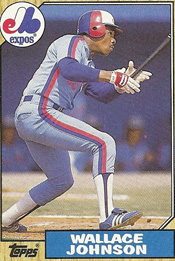
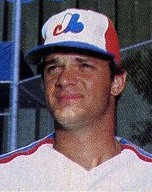
Bill Gullickson
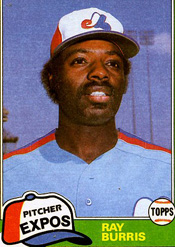
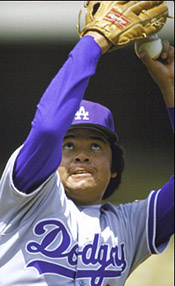
Fernando Valenzuela
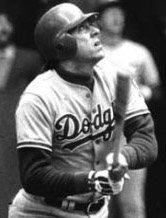
Rick Monday watching his pennant-winning HR
|
|
|